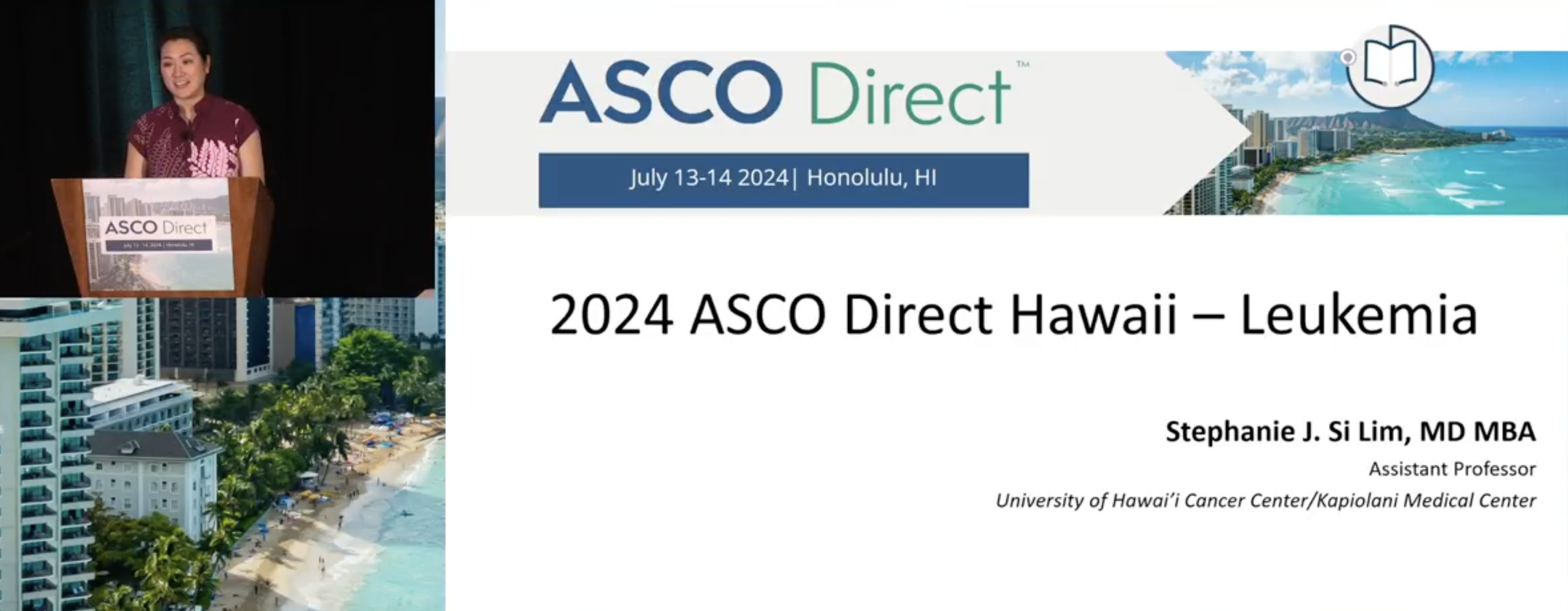ASCO Honolulu: Dr Si Lim Discusses the ASC4FIRST Trial in CML
Presented by:
Stephanie J. Si Lim, MD MBA, Assistant Professor, University of Hawai’i Cancer Center/Kapiolani Medical Center
Meeting:
ASCO Direct Honolulu, 2024
The Bottom Line
Tyrosine kinase inhibitors (TKIs) including imatinib and others are the current standard of care for patients with newly diagnosed chronic myeloid leukemia (CML), but many patients fail to achieve an adequate response to these agents or have to discontinue due to toxicity. Results from the ASC4FIRST trial show that first line treatment with asciminib, a next generation TKI, improved efficacy, and was better tolerated versus other TKIs for patients with newly diagnosed CML.
Background:
Chronic myeloid leukemia (CML) is a type of blood cancer characterized by proliferation of myeloid cells. The cancer cells in CML are able to grow uncontrollably due to the presence of a specific genetic alteration called the Philadelphia chromosome (Ph+). This molecular alteration results in the creation of a chronically activated enzyme called a kinase, which can be inhibited by specific class of drugs called tyrosine kinase inhibitors (TKIs). Initial CML treatment consists of the first-generation TKI imatinib or the later developed “second generation” (2G) TKIs, but many patients fail to achieve an optimal response to the treatment, and a subset of patients can also experience adverse events such as GI and cardiac toxicity with long term use of these agents. Asciminib is a newer TKI designed to improve efficacy in CML and reduce “off target” adverse events for better tolerability and adherence to therapy relative to other TKIs. The ASC4FIRST trial was a pivotal phase 3 study investigating the efficacy and safety of asciminib relative to the investigator’s choice of TKI therapy, for newly diagnosed patients with CML.
Trial Design and Patients:
Patients in the trial (N=405) were adults 18 years or over with Ph+, chronic phase CML and no prior therapy with a TKI. There were 2 primary endpoints in the trial, first being the major molecular response (MMR) rate at Week 48 for asciminib versus other investigator chosen TKIs; the second was MMR at Week 48 for asciminib versus investigator chosen TKIs in the imatinib stratum. At the initial cutoff time for the analysis, Dr Si Lim noted that more patients were continuing treatment in the asciminib arm versus the TKI arm (86.1% vs. 68.6%, respectively), with more patients having to discontinue their treatment in the TKI arm (13.4% vs. 29.9%, respectively), largely due to adverse events or progression of their disease.
Main Trial Results:
The results showed a significant benefit of asciminib over other TKIs, with a Week 48 MMR rate of 69.3% and 40.2%, and the difference was statistically significant (P<0.001). The secondary endpoint of MMR for asciminib versus other TKIs in the imatinib stratum was also numerically higher at Week 48 (66.0% vs. 57.8%). A benefit of asciminib was also observed across all of the demographic subgroups (e.g., age, sex) and regardless of their prognostic group.
Adverse Events and Toxicities:
Dr Si Lim noted that the safety profile for asciminib was “quite favorable” versus both imatinib as well as 2G TKIs. The rate of grade 3 or higher adverse events (38.0%, 44.4%, 54.9%), adverse events leading to discontinuation (4.5%, 11.1%, 9.8%), and events leading to a dose reduction or discontinuation of drug (30.0%, 39.4%, 52.9%) were all lower for asciminib versus imatinib, or 2G TKIs, respectively.
Conclusions and Faculty Insights:
Summarizing the results for ASC4FIRST, Dr Si Lim noted that asciminib demonstrated superior efficacy compared to all standard of care frontline TKIs, and both primary objectives in the trial were met with a high statistical significance. In addition, the tolerability of asciminib was markedly improved relative to other standard of care TKIs, with lower rates of grade 3 or higher adverse events and half the number of discontinuations due to adverse events. In view of these results, Dr Si Lim noted that asciminib has the potential to become the therapy of choice for patients with newly diagnosed, chronic phase CML.
Speaker Disclosure Information:
Dr Si Lim reported no relevant financial disclosures for this presentation.

